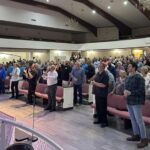Promised
1 Thessalonians 4:13–18
Much of Paul’s burden for the young group of believers at Thessalonica is to prepare them for what lies ahead. He had told them to expect persecution from their unbelieving neighbors (3:4) and now assures them of God’s eternal plans for all who are in Christ. Their grieving loved ones were curious about those who had died.
Paul says, “We do not want you to be uninformed about those who are asleep so that you will not grieve as do those who have no hope.” Grieving is natural, but ours is tempered by two great assurances: Our loved ones are with Christ, and we shall see them again.
“Sleep” is a figure of speech and not to be taken literally. Scripture assures us the faithful dead with Christ are in paradise, enjoying a well-earned rest and awaiting a glorious future.
“For if we believe that Jesus died and rose again, even so God will bring with Him those who have fallen asleep in Jesus.” Notice the “if” at the start of that great promise. Everything is conditional on “if we believe.” When a man said to Jesus, “If you can do anything, take pity on us,” our Lord answered, “All things are possible to him who believes!” (Mark 9:22–23).
Hope (13–14)
Hope, we are told, is a combination of desire plus expectation. We want something to happen and have reason to believe it shall. This is the Christian hope for the return of Christ and our resurrection. In response to those who say such a hope is without a basis, we respond with the Apostle Peter, “God … has caused us to be born again to a living hope through the resurrection of Jesus Christ from the dead” (1 Pet. 1:3). Because of the empty tomb we have a living hope. A dead hope would be to trust in a savior in a grave (something millions of people do). This hope we have as an anchor for our souls (Heb. 6:19). The old gospel song says, “In times like these we need an anchor.”
Return (15–16)
We who are living when Jesus returns will have no advantage over those who have died in Him. “The dead in Christ shall rise first.” That’s the promise.
While Paul gives this assurance “by the word of the Lord,” we have no evidence in Scripture for Jesus having said it. We conclude this was a new revelation being delivered from the apostle himself. Scripture says “men spoke from God as they were carried along by the Holy Spirit” (2 Pet. 1:21). As Paul told the Thessalonians about his preaching, “… you accepted it not as the word of mere men, but for what it really is, the word of God” (2:13).
Reunion (17–18)
We will “meet the Lord in the air.” As amazing as that promise is, it gets even better: “So shall we always be with the Lord.” While we have a lot of questions about our future and God’s plans for the redeemed, we are assured we will be with Jesus. So wherever it is and however it will be, it’s all good.
A fun study is to find the places the Lord called someone to His work and they began to find excuses. Time and again God would answer them, “I will be with you.” He said it to Moses in Exodus 3, Joshua in Joshua 1, Gideon in Judges 6:16 and Jeremiah in Jeremiah 1. The Lord clearly felt His presence would compensate for our weaknesses. When He commissioned the disciples, Jesus said, “I am with you always, even to the end of the world” (Matt. 28:20).
Let’s give thanks today that He is with us, both now and forever.
By Joe McKeever
Pastor, writer and cartoonist from Ridgeland, Mississippi.




